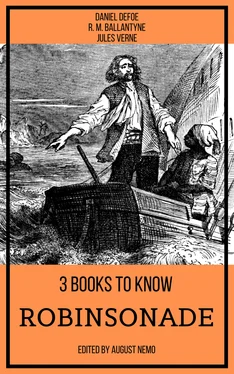In a few minutes more we were all assembled on the beach. Being unable to speak to the savages, we went through the ceremony of shaking hands, and expected they would depart; but before doing so, Tararo went up to Jack and rubbed noses with him, after which he did the same with Peterkin and me! Seeing that this was their mode of salutation, we determined to conform to their custom; so we rubbed noses heartily with the whole party, women and all! The only disagreeable part of the process was when we came to rub noses with Mahine; and Peterkin afterwards said that when he saw his wolfish eyes glaring so close to his face, he felt much more inclined to bang than to rub his nose. Avatea was the last to take leave of us, and we experienced a feeling of real sorrow when she approached to bid us farewell. Besides her modest air and gentle manners, she was the only one of the party who exhibited the smallest sign of regret at parting from us. Going up to Jack, she put out her flat little nose to be rubbed, and thereafter paid the same compliment to Peterkin and me.
An hour later the canoe was out of sight; and we, with an indefinable feeling of sadness creeping round our hearts, were seated in silence beneath the shadow of our bower, meditating on the wonderful events of the last few days.
SAGACIOUS AND MORAL Remarks in Regard to Life — A Sail! — An Unexpected Salute — The End of the Black Cat — A Terrible Dive — An Incautious Proceeding and a Frightful Catastrophe.

LIFE IS A STRANGE COMPOUND. Peterkin used to say of it that it beat a druggist’s shop all to sticks; for whereas the first is a compound of good and bad, the other is a horrible compound of all that is utterly detestable. And indeed the more I consider it, the more I am struck with the strange mixture of good and evil that exists, not only in the material earth, but in our own natures. In our own Coral Island we had experienced every variety of good that a bountiful Creator could heap on us. Yet on the night of the storm we had seen how almost, in our case — and altogether, no doubt, in the case of others less fortunate — all this good might be swept away for ever. We had seen the rich fruit-trees waving in the soft air, the tender herbs shooting upwards under the benign influence of the bright sun; and the next day we had seen these good and beautiful trees and plants uprooted by the hurricane, crushed and hurled to the ground in destructive devastation. We had lived for many months in a clime, for the most part, so beautiful that we had often wondered whether Adam and Eve had found Eden more sweet; and we had seen the quiet solitudes of our paradise suddenly broken in upon by ferocious savages, and the white sands stained with blood and strewed with lifeless forms, yet among these cannibals we had seen many symptoms of a kindly nature. I pondered these things much, and while I considered them there recurred to my memory those words which I had read in my Bible: “The works of God are wonderful, and His ways past finding out.”
After these poor savages had left us we used to hold long and frequent conversations about them, and I noticed that Peterkin’s manner was now much altered. He did not, indeed, jest less heartily than before, but he did so less frequently; and often there was a tone of deep seriousness in his manner, if not in his words, which made him seem to Jack and me as if he had grown two years older within a few days. But indeed I was not surprised at this when I reflected on the awful realities which we had witnessed so lately. We could by no means shake off a tendency to gloom for several weeks afterwards; but as time wore away, our usual good spirits returned somewhat, and we began to think of the visit of the savages with feelings akin to those with which we recall a terrible dream.
One day we were all enjoying ourselves in the Water Garden preparatory to going on a fishing excursion, for Peterkin had kept us in such constant supply of hogs that we had become quite tired of pork and desired a change. Peterkin was sunning himself on the ledge of rock, while we were creeping among the rocks below. Happening to look up, I observed Peterkin cutting the most extraordinary capers and making violent gesticulations for us to come up; so I gave Jack a push and rose immediately.
“A sail! a sail — Ralph, look — Jack, away on the horizon there, just over the entrance to the lagoon!” cried Peterkin as we scrambled up the rocks.
“So it is — and a schooner, too!” said Jack as he proceeded hastily to dress.
Our hearts were thrown into a terrible flutter by this discovery, for if it should touch at our island, we had no doubt the captain would be happy to give us a passage to some of the civilised islands, where we could find a ship sailing for England or some other part of Europe. Home, with all its associations, rushed in upon my heart like a flood; and much though I loved the Coral Island and the bower which had now been our home so long, I felt that I could have quitted all at that moment without a sigh. With joyful anticipations we hastened to the highest point of rock near our dwelling and awaited the arrival of the vessel, for we now perceived that she was making straight for the island under a steady breeze.
In less than an hour she was close to the reef, where she rounded-to and backed her topsails in order to survey the coast. Seeing this, and fearing that they might not perceive us, we all three waved pieces of cocoa-nut cloth in the air, and soon had the satisfaction of seeing them beginning to lower a boat and bustle about the decks as if they meant to land. Suddenly a flag was run up to the peak, a little cloud of white smoke rose from the schooner’s side, and before we could guess their intentions, a cannon-shot came crashing through the bushes, carried away several cocoa-nut trees in its passage, and burst in atoms against the cliff a few yards below the spot on which we stood.
With feelings of terror we now observed that the flag at the schooner’s peak was black, with a Death’s-head and cross-bones upon it. As we gazed at each other in blank amazement, the word “pirate” escaped our lips simultaneously.
“What is to be done?” cried Peterkin as we observed a boat shoot from the vessel’s side and make for the entrance of the reef. “If they take us off the island, it will either be to throw us overboard for sport or to make pirates of us.”
I did not reply, but looked at Jack, as being our only resource in this emergency. He stood with folded arms, and his eyes fixed with a grave, anxious expression on the ground. “There is but one hope,” said he, turning with a sad expression of countenance to Peterkin. “Perhaps, after all, we may not have to resort to it. If these villains are anxious to take us, they will soon overrun the whole island. But come, follow me.”
Stopping abruptly in his speech, Jack bounded into the woods, and led us by a circuitous route to Spouting Cliff. Here he halted, and advancing cautiously to the rocks, glanced over their edge. We were soon by his side, and saw the boat, which was crowded with armed men, just touching the shore. In an instant the crew landed, formed line, and rushed up to our bower.
In a few seconds we saw them hurrying back to the boat, one of them swinging the poor cat round his head by the tail. On reaching the water’s edge he tossed it far into the sea, and joined his companions, who appeared to be holding a hasty council.
“You see what we may expect,” said Jack bitterly. “The man who will wantonly kill a poor brute for sport will think little of murdering a fellow-creature. Now, boys, we have but one chance left — the Diamond Cave.”
Читать дальше













